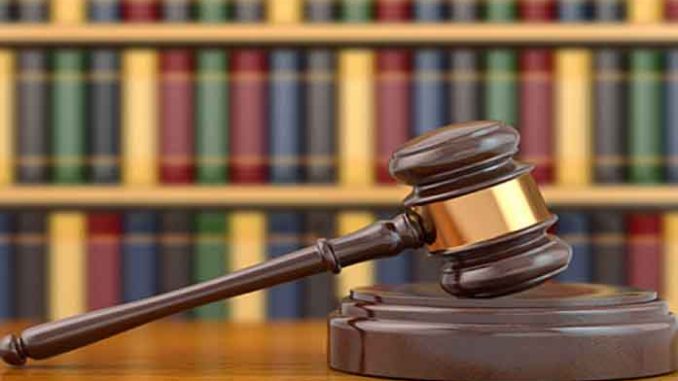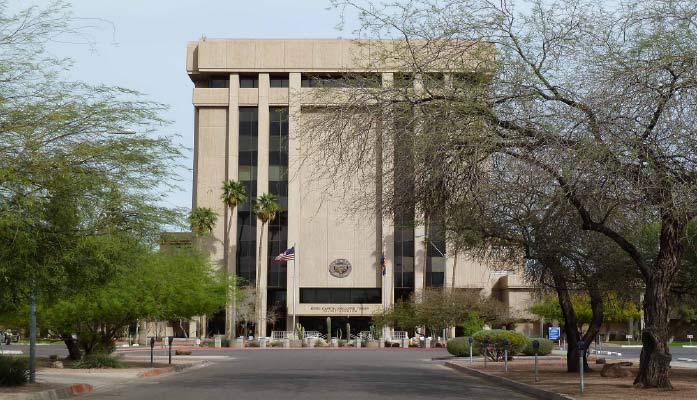
by Terri Jo Neff | Mar 1, 2022 | News
By Terri Jo Neff |
Who has authority to settle election related lawsuits involving the State of Arizona, its various agencies, and political subdivisions such as counties is the subject of proposed legislation slated for consideration by the House Committee of the Whole on Monday.
House Bill 2621 introduced by Rep. Jacqueline Parker as a strike everything on an earlier bill seeks to ensure the proper elected officials are aware of and involved in lawsuits in which “the constitutionality, legality or application” of Arizona Revised Statutes, Title 16 Elections and Electors, is questioned.
Parker’s bill creates a new law, ARS 16-194, prohibiting any party representing the State, an agency of the state, or a political subdivision of Arizona from agreeing to or signing a settlement agreement or a consent decree in any civil proceeding involving the state’s election laws, with the exception of disputes arising from the Citizens Clean Elections Act.
HB2621 leaves intact current state law requiring the Arizona Attorney General, the Speaker of the House, and the Senate President be served with legal filings involving a constitutional challenge to any state statute. Those three state officers also have the right under current state law to make their positions known to any court presiding over such a lawsuit.
The bill would likely prevent a repeat of the confusion leading up to the 2020 General Election when Arizona Secretary of State Katie Hobbs retained her own legal counsel to respond to a lawsuit filed in federal court to change the application of the state’s voter registration deadline.
The federal court issued an order extending the state’s statutory registration deadline despite the fact Hobbs had not consulted with all 15 of the state’s county recorders who actually conduct voter registration. Hobbs also did not immediately appeal the federal court order until Gov. Doug Ducey, House Speaker Rusty Bowers, and Senate President Karen Fann challenged the deadline extension.

by Terri Jo Neff | Feb 27, 2022 | News
By Terri Jo Neff |
A bill which would make it easier for people to be informed of what a city or town government is doing racked up three unanimous votes in the Arizona House of Representatives on its way to the State Senate.
House Bill 2095 (posting of notices; municipal websites) amends Arizona Revised Statute 9-812 to require a city or town to post several types of notices of a public character on the municipality’s website. This would be in addition to any current requirement for the notices to be published in a local newspaper.
Issues which are of a public character or public purpose include things such as elections, invitations for bids, notices of letting contracts, and changes in laws or ordinances.
Rep. Gail Griffin (R-LD14) introduced HB2095 which was transmitted to the Arizona Senate. While in the House, the bill received a 13 to 0 vote in the House Appropriations Committee, a 7 to 0 vote in the House Rules Committee, and a 59 to 0 vote during Thursday’s Third Reading in the House.
The changes to ARS 9-812 would not impact state laws related to publishing public character notices in newspapers, nor does it alter current requirements for posting agendas or minutes of a city or town council meeting.
HB2095 needs at least 16 votes in the 30-member Senate to make it to Gov. Doug Ducey’s desk.

by Terri Jo Neff | Feb 26, 2022 | Economy, News
By Terri Jo Neff |
State lawmakers continue to propose ways to rectify Arizona’s severe healthcare workforce shortage, including a bipartisan vote on House Bill 2691 to increase collaboration among the state’s education and healthcare communities.
Under HB2691, five new healthcare related programs would be established to promote various training efforts in an effort to address an ongoing shortage for nurses and other medical professionals. The programs are:
- The Arizona Nurse Education Investment Program which would increase the capacity of nursing education programs in Arizona to increase the number of all levels of nurses graduating from the state’s nursing education programs. This is intended to address Arizona’s yearslong nursing shortage.
- An Arizona Department of Health Services grant program to expand the capacity of preceptor training for nurse students and new nurse graduates. This would ensure an increase in instructors available to handle expanded nursing programs.
- The Nurse Transition to Practice Program to better support and develop new nurses, provide evidence-based professional development, and more rapidly accelerate the novice nurse to a competent nurse.
- A grant program to encourage and support more preceptorships in Arizona for the training and development of graduate students wishing to become physicians, advanced practice registered nurses, dentists, and physician assistants.
- A pilot program to develop and expand capacity of behavioral health programs at community colleges. This would include coverage of tuition, fees, and related educational expenses for eligible students.
HB2691 also seeks to make it less difficult for military members who wish to receive credit in a healthcare education program for experience and skills developed during their service.
The bill passed its Third Reading in the House on Thursday with a 56 to 3 vote and has been transmitted to the Arizona Senate for consideration.

by Terri Jo Neff | Feb 23, 2022 | News
By Terri Jo Neff |
Voters would have the chance in November to approve adding a Lieutenant Governor position to the slate of Arizona’s executive officers if a bill introduced by Sen. J.D. Mesnard is signed into law.
Senate Bill 1255 provides the framework for adding a new state executive officer in the Arizona Constitution so that Arizonans could jointly elect a Lt. Governor with the Governor, just as Americans vote for a slate of President and Vice-President. The bill would also change who takes over if the Office of Governor becomes vacant.
Currently, the Arizona Secretary of State (SOS) ascends to the Governor’s Office in the event of a vacancy due to death, permanent disability, resignation, or removal. This has prompted past concerns with whether a SOS -whose myriad duties include registering trademarks, managing the state archives, and serving as the state’s Chief Election Officer- was suited for the demands of a state governor.
Mesnard (R-LD17) is in his second term as state senator after previously serving eight years in the State House of Representatives. He says that while SOS is an important office, “there is very little about the office that prepares you to be governor,” he told KFYI’s James T. Harris on Monday.
He also noted instances in recent years when the SOS who replaced an outgoing Governor was not of the same party. This can lead to “a pretty radical shift” in policy, Mesnard noted.
Such uncertainty and turmoil would be avoided if each nominee for Governor names a Lt. Governor to run on the ticket together. It would ensure voters get what they ask for when they vote, he added. “There would be a lot more continuity, a lot more consistency,” Mesnard told Harris.
But Mesnard is not interested in simply creating a new state government office.
SB1255 would require the Lt. Governor to serve as the director of the Arizona Department of Administration (ADOA), which is the administrative and business operations hub of state government and its various agencies.
“The Department of Administration is plugged into all the different areas of the executive branch, everything from HR to regulation to payroll,” Mesnard said Monday, making it an ideal “training ground” for someone to ascend to the Governor’s Office.
The bill co-sponsored by Sen. Sean Bowie (D-LD18) cleared the Senate’s Government Committee last week on a bipartisan vote. It received a “proper for consideration” pass from the Senate Rules Committee on Wednesday and is now waiting to be scheduled for a third reading.
In the meantime, Mesnard has introduced a companion Senate Concurrent Resolution (SCR1024) which would put the proposed change to the Arizona Constitution in the hands of voters in November 2022. If approved by voters, the new Lt. Governor position would be included on the November 2026 state election.

by Terri Jo Neff | Feb 23, 2022 | News
By Terri Jo Neff |
Two bills designed to tweak Arizona’s voter registration laws had third readings in the House on Tuesday, resulting in party line votes of 31 to 28.
House Bill 2237 stipulates that a department, division, agency, or political subdivision of Arizona—or any person acting on behalf of one—may not register a person to vote on an election day and then deem that person eligible to vote in the same election. Doing so would be a Class 6 felony which carries a presumptive one-year prison sentence.
Under current law, someone seeking to register to vote must meet several criteria, such as being U.S. resident, being a resident of Arizona for 29 days before the election, and being at least 18 years of ago on or before the next election following registration.
There is also a deadline in Arizona for registering to vote – 29 days before the election.
However, some people are allowed to cast a provisional ballot on Election Day. The provisional ballot includes information for registering the person to vote going forward if it is determined the person is not already registered.
Rep. Jake Hoffman (R-LD12) introduced by HB2237 to ensure the information included with the provisional ballot is not used to register the voter until after election day. Otherwise, Arizona’s 29-day registration deadline could be circumvented.
A second bill introduced by Hoffman, HB2243 would add a simple advisory statement to all new voter registration forms. The advisory informs the person registering to vote that if they permanently move to another state after being registered in Arizona, then their Arizona voter registration will be cancelled.
Supporters of HB2243 say it will help keep Arizona’s voter database up-to-date. In addition, it would reduce the opportunity for fraud if the moved voter was on the early balloting list or lives in a community with vote-by-mail elections.
Hoffman had 11 co-sponsors on each of the two bills.





